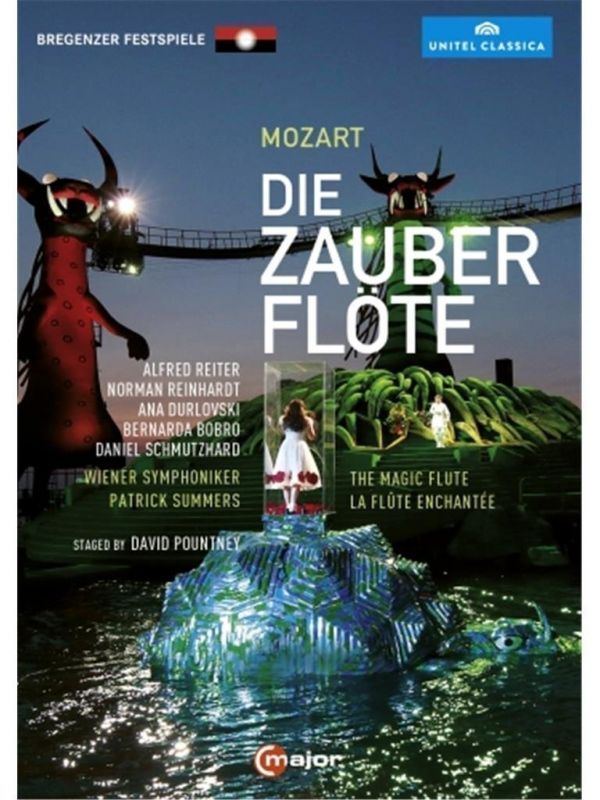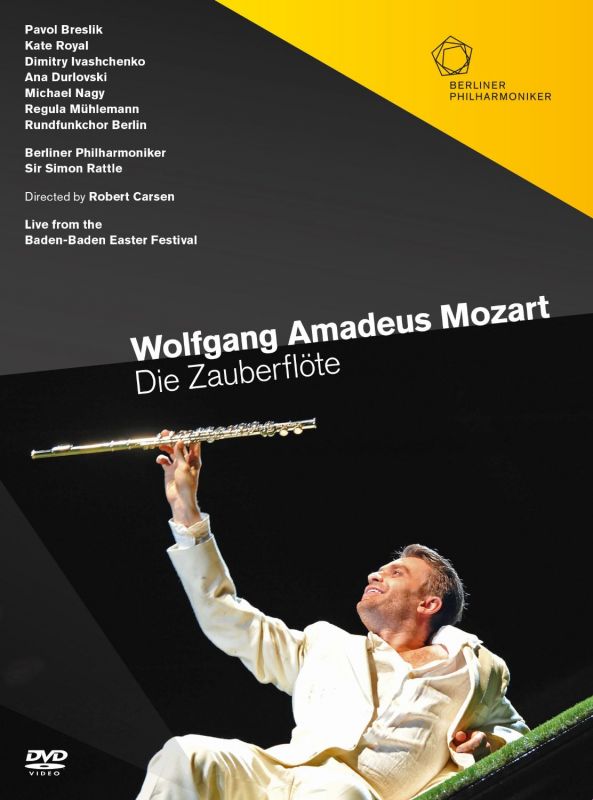MOZART Die Zauberflöte
Flutes on screen from the Baden-Baden festival and the floating stage at Bregenz
View record and artist detailsRecord and Artist Details
Composer or Director: Wolfgang Amadeus Mozart
Genre:
Opera
Label: C Major
Magazine Review Date: 12/2013
Media Format: Digital Versatile Disc
Media Runtime: 150
Mastering:
DDD
Catalogue Number: 713708

Tracks:
| Composition | Artist Credit |
|---|---|
| (Die) Zauberflöte, '(The) Magic Flute' |
Wolfgang Amadeus Mozart, Composer
Alfred Reiter, Sarastro, Bass Ana Durlovski, Queen of Night, Soprano Bernarda Bobro, Pamina, Soprano Daniel Schmutzhard, Papageno, Baritone Norman Reinhardt, Tamino, Tenor Patrick Summers, Conductor Prague Philharmonic Choir Vienna Symphony Orchestra Wolfgang Amadeus Mozart, Composer |
Composer or Director: Wolfgang Amadeus Mozart
Genre:
Opera
Label: Berlin Philharmoniker
Magazine Review Date: 12/2013
Media Format: Digital Versatile Disc
Media Runtime: 163
Mastering:
DDD
Catalogue Number: BPH130011

Tracks:
| Composition | Artist Credit |
|---|---|
| (Die) Zauberflöte, '(The) Magic Flute' |
Wolfgang Amadeus Mozart, Composer
Ana Durlovski, Queen of Night, Soprano Berlin Philharmonic Orchestra Berlin Radio Chorus Dimitri Ivashchenko, Sarastro, Bass Kate Royal, Pamina, Soprano Michael Nagy, Papageno, Baritone Pavol Breslik, Tamino, Tenor Simon Rattle, Conductor Wolfgang Amadeus Mozart, Composer |
Author: Richard Lawrence
So, for instance, the Queen stands beside Sarastro, their arms linked, during ‘In diesen heil’gen Hallen’, unseen by Pamina. The Queen and her ladies even participate in the dialogue with Sarastro after the March of the Priests. You could argue that it’s a solution to a non-existent problem, as the apparent reversal of good and evil is not really a difficulty; but it’s an intriguing conceit, even though it doesn’t accommodate the Monostatos question.
Carsen sees the opera as, among other things, a celebration of music. During the Overture, the chorus sits on the four-sided stage surrounding the pit, listening as though charmed like the animals that, sadly, don’t appear later on. Tamino is borne off by the others but, in the first of several death-related images, re emerges from a freshly dug grave. Papageno enters, weighed down with camping gear and playing a melodica (why?); the Queen is young, slim, in a knee-length black dress. And, of the excellent cast, I would single out Ana Durlovski for superb coloratura that is never cause for a moment’s anxiety. Simon Rattle takes the Act 2 quintet too fast for comfort – he should perhaps have taken Karl Böhm’s recording with the same orchestra as a model – and the postlude to ‘Ach, ich fühl’s’ is oddly matter-of-fact; but in general he balances solemnity and lightheartedness very nicely.
David Pountney’s production for the floating stage on the lake at Bregenz is equally memorable. Two caveats. The immense playing area doesn’t translate comfortably to the small screen, and the opera is performed without a break and with a few omissions. Pountney’s thesis is that both Sarastro and the Queen are ‘ailing powers…who will be superseded and made redundant by the new age’. We might not accept his view that Monostatos represents Sarastro’s repressed erotic urges but we are certainly made aware of the priest’s cruelty towards him.
The stage is dominated by three huge horned ‘dragon dogs’; there’s inflatable grass – more like reeds, really; the Three Ladies, voiced elsewhere, are puppets riding mythical beasts; the Three Boys arrive on a swimming turtle; and there are fireworks. Children will love this production. The performances are fine, including a magnificent Queen from – again – Ana Durlovski.
Discover the world's largest classical music catalogue with Presto Music.

Gramophone Digital Club
- Digital Edition
- Digital Archive
- Reviews Database
- Full website access
From £8.75 / month
Subscribe
Gramophone Full Club
- Print Edition
- Digital Edition
- Digital Archive
- Reviews Database
- Full website access
From £11.00 / month
Subscribe
If you are a library, university or other organisation that would be interested in an institutional subscription to Gramophone please click here for further information.




